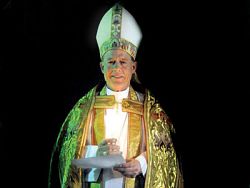Merry Christmas
Our world seems enthralled with power inasmuch as nations and individuals are often locked in fierce struggles to exert their will. Nations use military power to achieve their ends even when, as in the Korean Peninsula, they threaten the stability of the entire world. Political parties use the power of communication, especially on the Internet, as they vie for control in the chambers of government. And more and more, wealthy candidates use the power of money to get elected to political office. Corporations use their wealth and prestige to influence public opinion and ultimately, to make a profit. Even on a smaller scale, we see the use of power to control, to manipulate or to influence in the home, on the playground and in the workplace, evidenced in domestic violence, bullying at school and ruthless tactics to get promoted. Without a doubt, our world is constantly caught up in power struggles that leave their mark on the faces of countless millions and on the face of the earth itself.
It is precisely into this powerful world that our Savior comes once again this Christmas. In many ways, things have not changed all that much since the Nativity of Christ. Leaders like Herod are still using violent means to retain their power, vulnerable people like Mary and Joseph with no place to spend the night are still forgotten by the wealthy and employees like the shepherds are still struggling to make ends meet despite the large profits reaped by Wall Street. One would think that God would have thought ahead and given his Son some of the tools of power that would enable him to make his way in our world. And yet, the Savior comes to us, seemingly, as the epitome of powerlessness: a newborn infant. As such, he is completely dependent on his mother and father for his very existence. When it comes to surviving, he himself has nothing with which to succeed. He is completely at the mercy of the "powerful." I remember reading about a little girl who was asked to describe her family’s porcelain manger scene, passed on from one generation to the next. She responded with the words her parents had repeated over and over again, "It is fragile!" Yes, Christ comes to us as fragile human being.
And yet, we know through the eyes of faith that the Christ child, born in a manger, is the Savior of the world. He is the mighty God, the prince of peace, the hope of nations. Once again we are reminded of the lesson of Advent, namely, that things are not what they seem. Joseph discovered this in a dream, Mary discovered it in a visit from an angel, and we are invited to discover it anew as we gaze into the eyes of the infant Christ. When we look beyond the appearance of things, we realize that God is intimately at work in us, part of our very existence. What seems to be a helpless child is in fact the very power of God; indeed, he is God, "Who…did not regard equality with God something to be grasped. Rather, he emptied himself, taking the form of a slave, coming in human likeness and found human in appearance…" (Philippians 2: 6 – 7) God became one of us for no other reason than that he loves us beyond our wildest imaginings. The secret of God’s power is love. The incarnation celebrates God’s love for us, a love that is more powerful than absolutely any power in heaven or on earth: "Of this I am certain, neither death nor life, no angel or prince, not any power or height or depth nor any created thing can ever come between us and the love of God, made visible in Christ Jesus our Lord." (Romans 8: 38 – 39)
Christmas teaches us that God is at work in our lives. God is intimately part of us, indeed, in Christ he is one of us. Nothing is separate from God’s love. Even in my most difficult moments, my most painful moments, my darkest moments, God is with me. That is what Emmanuel means: God with us. The Christmas message is grounded in the reality that all creation is caught up in God’s loving providence. When we return God’s love, trust in God’s love, hope in God’s love and abide in God’s love, we become the power of God’s love in our fragile world.
This is what it means to see with the eyes of faith. What looks like failure, or pain, or hardship can transform us if we see God at work in it. Seen in this light, life takes on a deeper meaning and purpose. Sickness can be a catalyst to trust more in God and his desire to be one with us for all eternity rather than live our lives as if we were immortal. Failure prompts us to rely more on God and less on ourselves. Crises remind us that God is in control, not we. Truly, there is nothing more powerful that God’s love. Lord Acton was right, "Power corrupts and absolute power corrupts absolutely." However, the babe in the manger gives evidence to the fact that love is the antidote to power. Hence, love saves and God’s love saves absolutely. Once we are caught up in the love of God and the love of my neighbor who is the image and likeness of God, then we realize that we are truly powerful. Perhaps the only thing fragile about the manger scene is whether we will respond to God’s love for us or retain what we perceive to be power. Christmas invites us to choose love, Christ’s love, Christ’s power.
To you all, my brothers and sisters in Christ, I wish a blessed Christmas and a peaceful New Year. I ask the Christ Child to raise his arms of benediction over all of us in the Diocese of Salt Lake City as we grow closer together in the powerful ways of love. May the love of Christ that appeared to us on that first Christmas night, carry us powerfully through this life into eternity.
© Copyright 2025 The Diocese of Salt Lake City. All rights reserved.



Stay Connected With Us